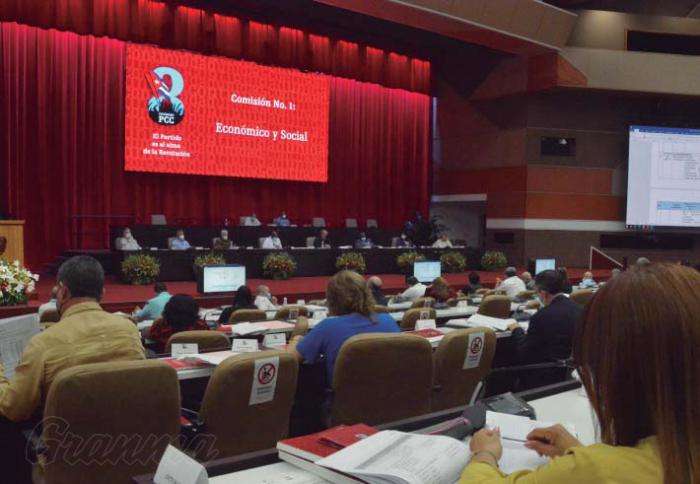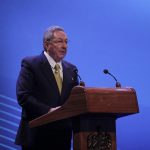Cuba: The economic evolution of Cuba to date and the characteristics of the current context have evidenced the need to update the Conceptualization of the Economic Model and the Guidelines, for the sake of greater coherence with the foundations and terms included in the new Constitution and with the results emanating from the application of the policies approved from the 6th Congress of the Communist Party, the newspaper Granma publishes.
Precisely, on the second day of work of the 8th Congress of the PCC, Commission 1, chaired by Prime Minister Manuel Marrero Cruz, presented the proposals to update the Guidelines of the Economic and Social Policy of the Party and the Revolution for the period 2021-2026, and the Conceptualization of the Economic Model and Cuban social of socialist development.
The exchanges were also attended by the members of the Political Bureau, Esteban Lazo Hernández, president of the National Assembly of People’s Power and the Council of State; Salvador Valdés Mesa, Vice President of the Republic; Ramiro Valdés Menéndez, Deputy Prime Minister, and Ulises Guilarte de Nacimiento, Secretary General of the Federation of Cuban Workers, among other Party and Government leaders.
The member of the Political Bureau and the Secretariat, Mercedes López Acea, in charge of the presentation of the two documents, highlighted that the preparation process developed by the delegations in all the country’s provinces contributed valid and enriching opinions to the quality of the Guidelines. updated and the project of the Conceptualization that is presented.
She explained that 113 proposals were made about updating the Conceptualization, and 157 about the Guidelines, which were evaluated and taken into account several of them, with the aim of improving the projects.
Concerning the updating of the Guidelines, of the 157 opinions collected (131 on content and 26 on form) by chapters, most of the proposals focused on the topics Social Policy (31), Industrial and Energy Policy (18), Economic Management Model (17) and Agroindustrial Policy (12).
THE ECONOMY AND ITS PROGRAMMATIC BASES
Strategic issues for the nation’s progress such as the economic management model, investment policy, science, technology and innovation and their impacts on society, and social policy, among others, were debated this Saturday by delegates at the Commission, within the framework of the analysis of the updating of the Guidelines.
The importance of strengthening the sustainable development of Cuban rural communities to mitigate the strong process of migration to urban areas, and take advantage of the potential that these localities represent for the national economy, was weighed in the debate by the guest of Pinar de Río, Carlos César Torres Páez, who pointed out that, to the new Guideline dedicated to promoting the advance of the mountainous regions of the country, rural areas should be inserted as a generality, which includes the plains and also the mountainous areas.
However, in the proposal to update the Guidelines there is one designed to promote a comprehensive policy for the development of local communities.
Several members of the Commission recognized the need to promote the advancement of these communities. The Vice President of the Republic, Salvador Valdés Mesa, emphasized that it is necessary to rescue and improve the rural life of the country.
For his part, the Prime Minister argued the importance of promoting economic-social activities that revitalize these communities, such as, for example, the incorporation of tourism to rural localities as an alternative for progress, which would also contribute to increasing tourism offers for the country.
“Work has been done in recent years so that, while promoting Cuba as a sun and beach destination, the Island is made known as a more diverse tourist pole: cultural, heritage, nature, agrarian”, Marrero stated.
When addressing the Social Policy section, López Acea mentioned, among the proposals, those related to the improvement of teaching activity and the increase in the quality of Health services.
Later, he made reference to the proposal of a new Guideline, aimed at “advancing the study of crypto currencies in the current conditions of the economy.”
Meanwhile, the Havana delegate Ania Lastre suggested modifying the wording of the Guideline referring to the supply book, one of the most debated issues of the day.
In this regard, the member of the Political Bureau, Marino Murillo Jorge, head of the Permanent Commission for Implementation and Development, conveyed the reassurance that the book, as a distribution mechanism, will be maintained, as long as there is no stable supply of products.
One of the points debated on the implementation of the Ordinance Task is the gradual elimination of undue gratuities and excessive subsidies.
This is what the Deputy Prime Minister and Minister of Economy and Planning, Alejandro Gil Fernández, referred to, who said that we cannot consider, as a concept, that all subsidies are harmful.
In an economy like ours – he explained – there is a level of subsidies that constitute productive incentives and can generate benefits for the financial performance of the country. These types of subsidies should not be canceled, but ordered in such a way that they become stimuli for development.
The Vice Premier warned that those that should be eliminated are the subsidies that cause losses, inefficiencies and diversion of resources.
In another moment of the exchange, the Minister of Communications and delegate from Havana, Jorge Luis Perdomo, praised how since the previous Congress to date the vision of the use of information and communication technologies has been strengthened, both in infrastructure , as in the political-ideological and in the practice of various sectors of society.
However, the expansion of technologies has posed many challenges for the nation, in a complex scenario of subversion and media war, of which Cuba is a constant victim.
The delegate from Havana, Rogelio Polanco, alluded to this problem, who highlighted the need to raise the culture in the responsible use of information and communication technologies, to avoid the dangers that the battle represents in the digital field.
Subsequently, the delegates of Commission 1 examined the proposal to update the Conceptualization of the Economic and Social Model, a document on which 113 opinions were previously issued, 55 on content and 58 on form.
Almost to seal the exchange, the capital’s delegate Susel Lameré spoke about the high degree of commitment reflected in the documents studied, which are aimed at facing and solving the problems of the economy.
“They are texts that express continuity and are essential for the Party’s work, so they must be incorporated into the work systems in the provinces, municipalities and grassroots organizations”, she emphasized.
Enriched with the delegates’ suggestions, the projects for updating the Guidelines and the Conceptualization of the Model will be submitted to the Congress for approval, in plenary session.
INTEREST IN IN-GROWING WORK
At the beginning of the day, Alejandro Gil Fernández updated the information on job applications in the municipal Labor Directorates, between the months of January and March 2021. There were 150,862 people who were interested in working, of which 93,584 accepted the job offer, 32% are under 35 years old, and 36% women.
According to the head of the Ministry of Economy and Planning, the figure reflects the positive impact represented by the increase in those interested in being employed, in accordance with the purposes of the Ordering Task, and with the comprehensive vision of what has happened in the first quarter of the year 2021, from the beginning of the monetary and exchange unification.

Redacción Digital
Equipo de redactores del sitio web de Radio Mayabeque



